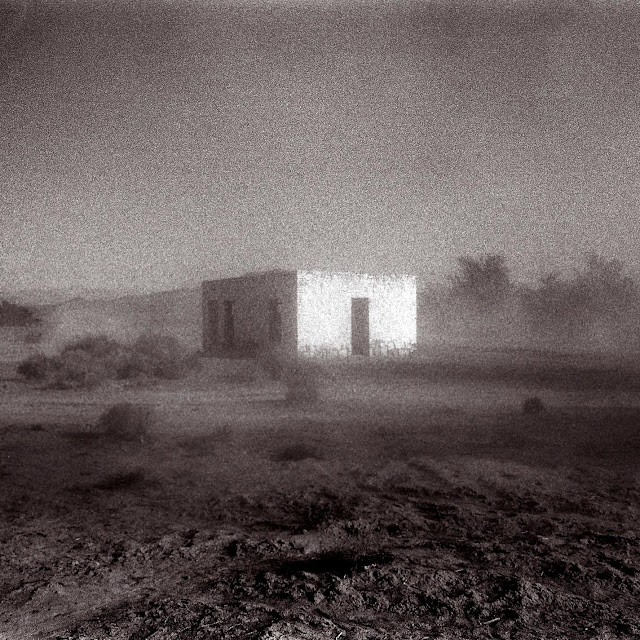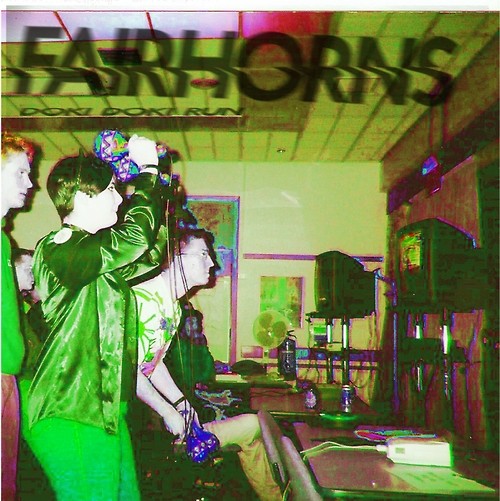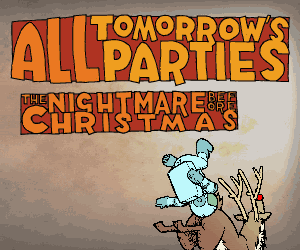
Dots: For those that are yet to experience Box Codax, what's the story, morning glory?
Nick McCarthy: Box Codax is a collaboration between myself, an old friend of mine from Germany called Alexander Ragnew, and my wife. Because I'm obviously very busy with Franz Ferdinand, we only ever meet at Christmas back in Germany. We then record songs and I work on them during the year before we meet the following winter to finish them off. That's pretty much how we've done this album [Hellabuster]. The first album was done before I'd ever really had any experience with recording and stuff, and was done in a back room. It was really ramshackle, done on an old computer that barely worked. It was pretty gritty. The songs were there, but I really wanted to make this one a bit more listenable for everyone involved so I roped in a real musician or two for a start. Paul [Thomson, Franz Ferdinand] features on a few of the tracks, and Joe [Mount, Metronomy] plays on and co-produced some of them. I've had a lot more experience in studios now as well. I still don't really know what I'm doing, but I'm getting there. It sounds a little bit better this time!
Dashes: Was the main aim of the follow-up to make yourselves more listenable then?
Nick: Yeah, definitely. I always thought we wrote really good songs, but I just wanted it to be something you could listen to on your headphones, really dive into, dream off on one to. It's based on really classic songwriting really, very memorable melodies so yeah, I just wanted to seep it into the mainstream or something like that. Not really, it's never going to be mainstream, but yeah. Can always try.
Dots: Perhaps it's a bit of a dirty term, but to what extent do you view Box Codax as a "side-project"?
Nick: I guess I've always been involved with musical things besides Franz Ferdinand, as has Alex [Kapranos]. When we first met we were in three or four bands simultaneously but then one thing kind of crystallised itself and felt really important to us, and that was, and still is, Franz Ferdinand. Box Codax is my little baby on the side that I love nurturing. It's what I return to when I can't stand the sight of the others any more. Nowadays I'm constantly attached to my laptop so if I'm waiting in an airport or whatever I get on my headphones and start mixing Box Codax tracks. I've been around the world mixing this album so it's quite diverse because of that I suppose. Also all the recordings were dotted around the place, whilst we wrote bits and pieces of the songs at different times too. It's something of a mixed bag as a result.
Dashes: Have you employed a perhaps more experimental method of songwriting for Box Codax?
Nick: I love writing music with other people, but sometimes it can be a compromise, one plus one equals three. But sometimes it's not; there's a minus in there and maybe a divide. Sometimes I quite like working on my own. Not all the time though. But the music on Box Codax is all mine, whilst all the lyrics were done by the singers. We're a classic songwriting team. A contemporary Gilbert and Sullivan or something.
Dots: Does that afford you a more liberal artistic expression?
Nick: Yeah, I guess so. It can be quite lonely writing alone, and it sometimes makes you think: "God, what am I doing?" It doesn't really, but it does a bit. But because I've got Franz Ferdinand to go back to, these two things go hand in hand. Which is quite nice. I suppose this is my little bit of freedom once a year.
Dashes: You're quite focussed on the visual side of the band, without ever really appearing yourselves. Do you have two separate pools of inspiration to dive into, both on the musical side and the more perhaps artistic side?
Nick: We're mainly about doing the music really, but because every song is effectively about a certain era, and because between us we know so many artists or filmmakers, the visual aspect just seemed like such an obvious thing to do. When I listen to music I usually watch the videos that go with it. And as I felt like every song on the record was a single, I guessed we'd better do the videos for all of them. I think it's important to have some kind of face, even if it's just mystique or whatever. On the first record, we just used to turn away from the camera. I don't think that's going to happen any more. But I don't think we're ever going to play live either so we need some kind of visual thing. For Franz Ferdinand, that's achieved through playing live but with Box Codax, the only gig we ever did was with some Jesus freaks. And that was by accident. Bad memories. It's always been a bit difficult for us to try and piece together a live show, but what would be good would be to play gigs in the dark. That'd be perfect for Box Codax actually. But because I recorded bits and pieces of the recordings here and there, I'm not sure how it'd work live. I don't want to play with a backing track, but what with it being a relatively low-budget venture, I can't really go and pay to get a big band in. I'd love to get Ringo's All-Starr band in to play Box Codax, I'd like that, but it's not possible. Obviously. But I definitely don't want to do the toilet circuit again. I've already done that once, and I can't think of anything worse than going through all that again!
Dots: You said you'd quite like to play in the dark. Is Box Codax in some way refreshing in that it removes you personally from the limelight?
Nick: Sure. I've always liked doing gritty, little homemade things and we used to do that with Franz Ferdinand too. When we used to put gigs on we used to organise everything involved with it. I used to quite like that. But now that the shows are obviously bigger, I can't set up a hundred-foot stage on my own so I'll just ask other people to do it! I still quite like lending a hand, makes you feel alive, get your limbs moving a bit instead of just going onstage and playing the same songs every night. Which is good fun as well, but you know...
Dashes: I don't know how often you Google yourselves, but there's not a particularly wealthy resource pool to draw upon. There was, however, a quote on Wikipedia, lifted from a blog entitled DISLOCATED UNDERBITE SPINAL ALPHABETISED ENCOURAGER TEMPLATES that pinpointed the Box Codax debut, Only An Orchard Away, somewhere between 'a total joke' and 'serious 'art' music'...
Nick: I wouldn't call it serious! We laugh a lot, but I suppose the songs are... kind of amusing. They're not a joke, it's not clown music, but it's supposed to be funny. Some of the lyrics are extremely funny, but at the same time they're extremely sad and that's why I love them so much. A little bit tragic. Tragicomedy. I don't know.
Dots: Finally, from your personal perspective, does the project predominantly represent the fruits of a ripe friendship?
Nick: Essentially, yeah. I'm really fortunate to be able to put records out in the knowledge that at least a handful of people will listen to them. I'm extremely lucky to be able to do that because I used to play in loads of bands that never got anywhere. So now I'm milking it.
Hellabuster is one hell of a record, and is out May 6th.
Box Codax.























